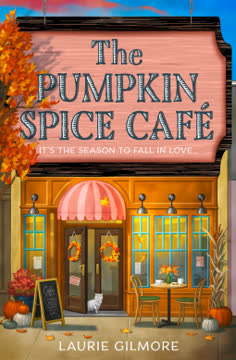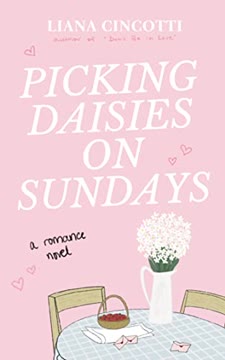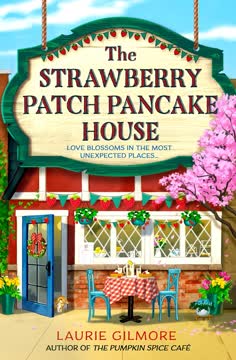Plot Summary
Autumn's First Blush
Sixteen-year-old Lucy Kane adores her small town of Briar Glen, where autumn's colors blaze and her life revolves around her mom's cozy coffee shop, Cup o' Jo. The season's beauty is a comfort, but change is in the air—both in the leaves and in Lucy's heart. She's a dreamer, a baker, and a loyal daughter, content in her routines and the rhythms of her close-knit community. But as the leaves turn, so does Lucy's sense that something big is about to disrupt her world. The arrival of a mysterious new student and the first hints of competition threaten the stability she's always known, setting the stage for a season of transformation.
The New Guy's Smile
When Jack Harper, the impossibly charming and bookish new kid, arrives at Briar Glen High, Lucy's world tilts. His green eyes and easy confidence make him the talk of the school, and Lucy can't help but notice him—especially when he offers her a replacement for her battered copy of Great Expectations. Their awkward, witty banter hints at a connection, but Lucy's skepticism and self-deprecating humor keep her guarded. Jack's presence is both intriguing and unsettling, stirring up feelings Lucy isn't sure she wants to face, especially as he seems to fit in everywhere she feels out of place.
Java Junction Arrives
The peaceful routine of Cup o' Jo is shattered when Lucy discovers that Java Junction, a massive coffee chain, is opening directly across the street. The news sends a chill through Lucy and her mom, Jo, who have poured their hearts into their independent shop. Tourists and locals alike are abuzz with speculation, and Lucy's pride in her mom's business is tinged with anxiety. The threat of losing their loyal customers to a faceless corporation feels personal, and Lucy's determination to defend Cup o' Jo hardens, even as her mom tries to stay optimistic.
Pumpkin Spice Panic
As autumn deepens, the demand for pumpkin spice lattes grows, and Lucy's disdain for the artificial, overhyped drink becomes a running joke. But with Java Junction's arrival, the pressure mounts to add a pumpkin spice latte to Cup o' Jo's menu. Lucy's mom suggests they adapt, but Lucy resists, clinging to authenticity and tradition. The tension between innovation and integrity simmers, mirroring Lucy's internal struggle to accept change. The pumpkin spice debate becomes a symbol of everything Lucy fears losing—her home, her identity, and her connection to her mom.
Pie, Pride, and Panic
When Jack visits Cup o' Jo and reveals that his family owns the new Java Junction, Lucy's anxiety boils over. In a moment of impulsive anger, she throws a pie in Jack's face, shocking herself and everyone around her. The incident becomes instant gossip, earning Lucy the nickname "Pieface" and threatening her already fragile reputation. The fallout is both mortifying and oddly liberating, forcing Lucy to confront her feelings about Jack, her own impulsiveness, and the ways she's been avoiding the reality of change.
Friendship and Flour
Lucy's best friends, Amber and Evie, become her anchors as she navigates the aftermath of the pie incident and the growing pressures at Cup o' Jo. Emergency baking sessions in Lucy's kitchen become a refuge, where laughter and flour fly in equal measure. Through shared recipes and honest conversations, Lucy begins to process her fears and frustrations. Her friends challenge her to see beyond her anxieties, encouraging her to experiment with new desserts for the upcoming fall festival and to consider that not all change is bad.
The Pie Incident
As word of the pie-throwing spreads, Lucy braces for social disaster. Surprisingly, Jack doesn't retaliate; instead, he keeps her secret, showing a kindness that confuses Lucy. The nickname "Pieface" sticks, but Lucy learns to wear it with a mix of embarrassment and pride. The incident becomes a turning point, forcing her to reckon with her own defensiveness and the ways she pushes people away. Jack's forgiveness and humor begin to thaw Lucy's resistance, hinting at the possibility of friendship—or something more.
Social Media Stir
With business slowing and Java Junction's grand opening drawing crowds, Lucy reluctantly takes Jack's advice to revamp Cup o' Jo's social media. She starts posting photos of her baking experiments and the shop's cozy atmosphere, discovering a new way to connect with customers. The response is immediate and overwhelming, bringing in a wave of new visitors and online attention. Lucy's pride in her work grows, but so does the pressure to keep up with the demands of internet fame and the expectations of her community.
Rivalry Brews
The rivalry between Cup o' Jo and Java Junction becomes the talk of the town, culminating in a high-stakes showdown at the fall festival's dessert contest. Lucy enters her signature pumpkin pie, hoping to win the cash prize and secure her mom's business. Jack, now a judge in the contest, complicates matters with his honesty and support. The competition exposes the complexities of loyalty, ambition, and the blurry line between friend and foe. Lucy's desire to win is matched only by her fear of losing what matters most.
Lessons in Baking
After the contest, Jack asks Lucy to teach him how to bake, offering to help with Cup o' Jo's social media in return. Their baking lessons are messy, hilarious, and unexpectedly intimate, breaking down the walls between them. Through spilled cream and shared laughter, Lucy discovers that Jack's confidence masks his own insecurities and longing for belonging. Their partnership in the kitchen becomes a metaphor for the slow, careful blending of trust, forgiveness, and affection.
The Great Pumpkin Quest
Determined to outdo Java Junction, Lucy embarks on a quest to create the ultimate pumpkin spice latte—one that's authentic, delicious, and uniquely hers. With Jack's encouragement, she experiments with fresh pumpkin, homemade spice blends, and secret ingredients, facing failure after failure. The process is both frustrating and exhilarating, teaching Lucy the value of patience, creativity, and letting go of perfection. The quest becomes a journey of self-discovery, as Lucy learns to trust her instincts and embrace the messiness of growth.
Whipped Cream Wars
In a series of increasingly ridiculous baking sessions, Lucy and Jack wage "whipped cream wars," turning their kitchen into a battlefield of sweetness and silliness. The playful chaos breaks down their remaining defenses, allowing vulnerability and attraction to surface. Amid the laughter, Lucy realizes that happiness isn't found in flawless recipes or perfect outcomes, but in the joy of sharing the process with someone who understands her. The whipped cream wars become a symbol of the freedom to be imperfect and loved.
Finding the Secret Ingredient
After countless failed attempts, Jack suggests that Lucy is rushing to bring the flavors together too quickly. Inspired, Lucy creates a slow-simmered pumpkin syrup, blending her love of tradition with newfound innovation. The secret ingredient, she discovers, isn't a spice or a technique, but the willingness to slow down, savor the moment, and let things come together in their own time. The perfect pumpkin spice latte is born—not from competition, but from collaboration, patience, and heart.
The Perfect PSL
Lucy's new pumpkin spice latte is an instant hit, drawing crowds and online acclaim. Cup o' Jo becomes the center of a social media frenzy, and Lucy is thrust into the spotlight. The attention is exhilarating but overwhelming, as Lucy grapples with the expectations of her community, her friends, and herself. The success she craved comes with a cost—exhaustion, self-doubt, and the fear of losing her sense of self amid the noise.
Fame and Fallout
As Cup o' Jo's fame grows, so do the pressures and resentments. Some locals accuse Lucy of turning Briar Glen into a tourist trap, while others celebrate her achievements. Lucy's relationships with her friends and her mom are strained by the demands of success and the constant scrutiny. The joy of creation is overshadowed by the burden of maintaining her image and meeting everyone's expectations. Lucy begins to question what she truly wants and who she is outside of her role at Cup o' Jo.
The Challenge
The rivalry between Cup o' Jo and Java Junction reaches its peak when a famous influencer proposes a live pumpkin spice latte challenge. The entire town—and the internet—watches as Lucy and Jack face off, each presenting their signature drink. The competition is fierce, but beneath the surface, it's a test of authenticity, courage, and the willingness to be seen. When Cup o' Jo's latte is declared the winner, Lucy is flooded with relief, pride, and an unexpected sense of emptiness.
After the Spotlight
In the aftermath of victory, Lucy is celebrated as a local hero, but the excitement quickly fades. She feels disconnected from her own achievements, overwhelmed by the demands of fame and the loss of her private joys. Conversations with Jack and her friends help her realize that she's been living for others' approval, neglecting her own happiness and passions. Lucy steps back from the spotlight, rediscovering the simple pleasures of baking, friendship, and quiet moments with her mom.
Rediscovering Joy
As autumn draws to a close, Lucy finds balance between ambition and contentment. She reconnects with her friends, forgives herself for her mistakes, and embraces the messiness of growing up. Baking becomes a source of joy again, not just a means to an end. Lucy and Jack's relationship deepens, built on trust, laughter, and shared vulnerability. In the glow of Halloween night, surrounded by friends and family, Lucy realizes that happiness isn't found in perfection or popularity, but in the courage to be herself and the love she gives and receives.
Characters
Lucy Kane
Lucy is the heart of Cup o' Jo and the novel itself—a sixteen-year-old whose identity is deeply entwined with her mom's coffee shop and the rhythms of small-town life. She is witty, self-deprecating, and passionate about baking, but struggles with anxiety, change, and the fear of losing what she loves. Lucy's relationships—with her mom, her friends, and Jack—are marked by both deep loyalty and a tendency to push people away when threatened. Her journey is one of learning to embrace imperfection, accept help, and find joy in both tradition and transformation. Through her, the novel explores themes of authenticity, vulnerability, and the courage to grow.
Jack Harper
Jack is the new kid whose arrival upends Lucy's world. With his striking green eyes, easy confidence, and love of literature, he quickly becomes popular, but beneath the surface, he's a boy who's moved often and longs for connection. Jack's family owns Java Junction, making him both a rival and a potential ally. He is patient, forgiving, and genuinely kind, often masking his own insecurities with humor and charm. Jack's willingness to forgive Lucy's impulsive actions and his openness to learning from her mark his growth. His relationship with Lucy is built on mutual respect, vulnerability, and the slow blending of trust and affection.
Jo Kane (Lucy's Mom)
Jo is Lucy's single mother and the owner of Cup o' Jo. She is a pillar of strength, creativity, and warmth, having built her business from the ground up. Jo's relationship with Lucy is close and sometimes codependent, marked by shared jokes, rituals, and a deep understanding of each other's fears and dreams. Beneath her optimism, Jo worries about the future of her shop and her daughter's happiness. She encourages Lucy to adapt and grow, even as she struggles with her own anxieties about change and letting go.
Amber
Amber is one of Lucy's closest friends, known for her athleticism, humor, and grounded perspective. She is quick to offer comfort, challenge Lucy's assumptions, and provide a reality check when needed. Amber's family is close to Lucy's, and her presence is a source of stability and encouragement. She pushes Lucy to try new things, embrace change, and not take herself too seriously.
Evie
Evie rounds out the trio of friends, bringing wit, honesty, and a touch of cynicism. She is unafraid to call Lucy out on her avoidance or self-sabotage, but does so with love and humor. Evie's outsider perspective—having moved to Briar Glen more recently—gives her a unique understanding of both the town's charms and its limitations. She helps Lucy see beyond her anxieties and encourages her to take risks.
Sheva and Danielle
Sheva and Danielle are part-time employees at Cup o' Jo who become like extended family to Lucy and her mom. They provide comic relief, practical help, and a sense of continuity amid the chaos. Their loyalty and belief in Cup o' Jo's uniqueness reinforce the shop's role as a community hub.
Jack's Parents (Erin and Greg Harper)
Erin and Greg are the owners of the new Java Junction and Jack's parents. They are portrayed as kind, respectful, and genuinely interested in integrating into Briar Glen, not as villains. Their presence challenges Lucy's assumptions about competition and forces her to see the humanity behind the corporate façade. Their support of Jack and willingness to connect with Jo and Lucy add depth to the story's exploration of rivalry and community.
Melanie Craddock
Melanie is the head cheerleader and a symbol of high school popularity. Initially perceived as a rival, she surprises Lucy with moments of kindness and insight, reminding her that people are more complex than their stereotypes. Melanie's interactions with Jack and Lucy highlight the shifting dynamics of high school social life.
Mrs. Vervone
Lucy's former geography teacher and a Cup o' Jo regular, Mrs. Vervone represents the town's old guard—loyal to local businesses and resistant to change. Her support and candid opinions provide both comfort and pressure for Lucy and her mom, embodying the expectations of the community.
Trissy (The Influencer)
Trissy is a social media influencer whose arrival in Briar Glen brings both opportunity and chaos. She is polished, ambitious, and always "on," but her presence forces Lucy to confront the realities of fame, authenticity, and the cost of public attention. Trissy's challenge sets the stage for the story's climax and prompts Lucy to reevaluate her motivations and desires.
Plot Devices
Rivalry as Catalyst for Growth
The arrival of Java Junction and the ensuing rivalry serve as the primary engine of the plot, pushing Lucy and her mom out of their comfort zones. The competition is not just external but internal, as Lucy grapples with her own resistance to change, fear of failure, and desire to protect what she loves. The rivalry is nuanced, with Jack and his family portrayed as complex, well-intentioned people rather than simple antagonists. This device allows the story to explore themes of authenticity, innovation, and the value of tradition.
Food as Metaphor for Connection
Throughout the novel, food—especially baking—serves as a metaphor for creativity, love, and the blending of old and new. Recipes are passed down, adapted, and shared, mirroring the evolution of Lucy's relationships and her journey toward self-acceptance. The process of creating the perfect pumpkin spice latte becomes a stand-in for Lucy's struggle to balance tradition and innovation, individuality and community.
Humor and Self-Deprecation
The story is laced with humor, from Lucy's sarcastic inner monologue to the slapstick chaos of baking lessons and pie-throwing incidents. This levity allows the narrative to tackle serious themes—anxiety, change, competition—without becoming heavy-handed. Humor becomes a coping mechanism for Lucy and a bridge to connection with others, especially Jack.
Social Media and Modern Fame
The rise of Cup o' Jo's social media presence introduces new pressures and opportunities, reflecting the realities of contemporary small business and teenage life. The viral success of Lucy's pumpkin spice latte brings both validation and anxiety, forcing her to navigate the double-edged sword of internet fame. The influencer challenge serves as a climactic plot device, testing Lucy's authenticity and resilience.
Slow-Burn Romance
The relationship between Lucy and Jack unfolds gradually, moving from rivalry and misunderstanding to friendship and, eventually, romance. Their connection is built on mutual respect, forgiveness, and the willingness to be seen in all their messiness. The slow-burn dynamic allows for deep character development and emotional payoff.
Festival and Community Events
The fall festival, dessert contest, and influencer challenge provide high-stakes settings for the story's major confrontations and turning points. These events force Lucy to perform, compete, and ultimately choose between external validation and internal fulfillment. The communal nature of these gatherings underscores the importance of belonging and the challenges of standing out.
Symbolic Use of Autumn
The progression of autumn—from the first blush of color to the final days of Halloween—parallels Lucy's journey from resistance to acceptance, from fear to joy. The changing leaves, the rituals of baking and celebration, and the encroaching winter all serve as reminders of the inevitability and beauty of change.
Analysis
is a heartfelt, witty exploration of change, identity, and the messy process of growing up in a world where tradition and innovation collide. At its core, the novel is about the courage to embrace imperfection, the value of authentic connection, and the importance of finding joy in both the familiar and the new. Through Lucy's journey—from anxious defender of the status quo to creative, self-assured innovator—the story examines the pressures of modern adolescence: the lure and danger of social media fame, the complexities of competition, and the challenge of balancing personal happiness with communal expectations. The rivalry between Cup o' Jo and Java Junction is less about business than about the struggle to define oneself in the face of change. The novel's humor, warmth, and vivid sense of place make it both a comfort read and a call to action: to slow down, savor the moment, and trust that the best things—like the perfect pumpkin spice latte—come from patience, collaboration, and a willingness to let life's flavors blend in their own time.
Last updated:
Review Summary
Pumpkin Spice & Everything Nice received mixed reviews, with an average rating of 3.07 out of 5. Many readers found it a cozy, fall-themed read but criticized the lack of romance and character development. Some appreciated the Gilmore Girls-like small-town atmosphere and coffee shop setting. However, others felt the plot was weak and the main character unlikeable. Younger readers seemed to enjoy it more, while older readers found it juvenile. The book's strengths were its autumn vibes and quick pacing, but it fell short for those expecting a more substantial YA romance.
Similar Books
Download PDF
Download EPUB
.epub digital book format is ideal for reading ebooks on phones, tablets, and e-readers.














